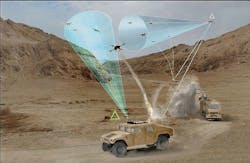DARPA MFP drone-defense program seeks to protect moving convoys from swarms of attacking small UAVs
ARLINGTON, Va., 3 Nov. 2016. U.S. military researchers are asking for industry's help in developing an agile and mobile drone-defense system that can defeat a raid of self-guided, small unmanned aerial vehicles (UAVs) that are attacking important targets like high-value moving convoys.
Officials of the U.S. Defense Advanced Research Projects Agency (DARPA) in Arlington, Va., released an industry solicitation last week (DARPA-PS-17-01) for the Mobile Force Protection (MFP) program.
The potential $63 million project seeks ways to defend against not only today's radio-controlled and GPS-guided weaponized UAVs, but also against future UAVs that navigate by visual means in large groups to gather intelligence and coordinate attacks against one or more high-value moving targets.
Of particular interest is the ability to counter relatively small fixed-wing or helicopter UAVs that weigh less than 200 pounds apiece, DARPA officials say. An MFP system must be able to integrate new approaches and technologies quickly, and work on ground vehicles, surface vessels, and aircraft.
The program's first phase will develop enabling technologies. If viable, the program will move to a second and third phase that will culminate in a prototype system demonstration. This solicitation is only for the program's first phase, which should be worth $3 million for each of several contractors.
The MFP program will consist of three phases, each culminating in an open-air demonstration against continuously more sophisticated threats and challenging scenarios.
An MFP system could include distributed and elevated sensors and effectors networked to form a fused air surveillance picture, be controlled for fast decisive action, and provide several low-risk UAV-neutralization options.
A top-level system MFP architecture would boil down to three steps; sense, decide, and then act using a neutralization web that integrates existing and emerging sensors through a fusion engine.
To demonstrate the system, DARPA experts will use the U.S. Army Maneuver Aviation and Fires Integration Application (MAFIA) as the backbone operating system to enable a system plug-and-play environment, and DARPA will consider only system prototypes that incorporate a MAFIA architecture.
Companies interested should mail or hand-deliver proposals no later than 12 Jan. 2016 to the Defense Advanced Research Projects Agency (DARPA), Mobile Force Protection Program, Attn: Contracts Management Office/D. Peter Donaghue, Program Solicitation Number: DARPA-PS-17-01, 675 N. Randolph St., Arlington, VA 22203-1714.
Email questions or concerns to DARPA at [email protected]. More information is online at https://www.fbo.gov/spg/ODA/DARPA/CMO/DARPA-PS-17-01/listing.html.
Learn more: search the Aerospace & Defense Buyer's Guide for companies, new products, press releases, and videos

